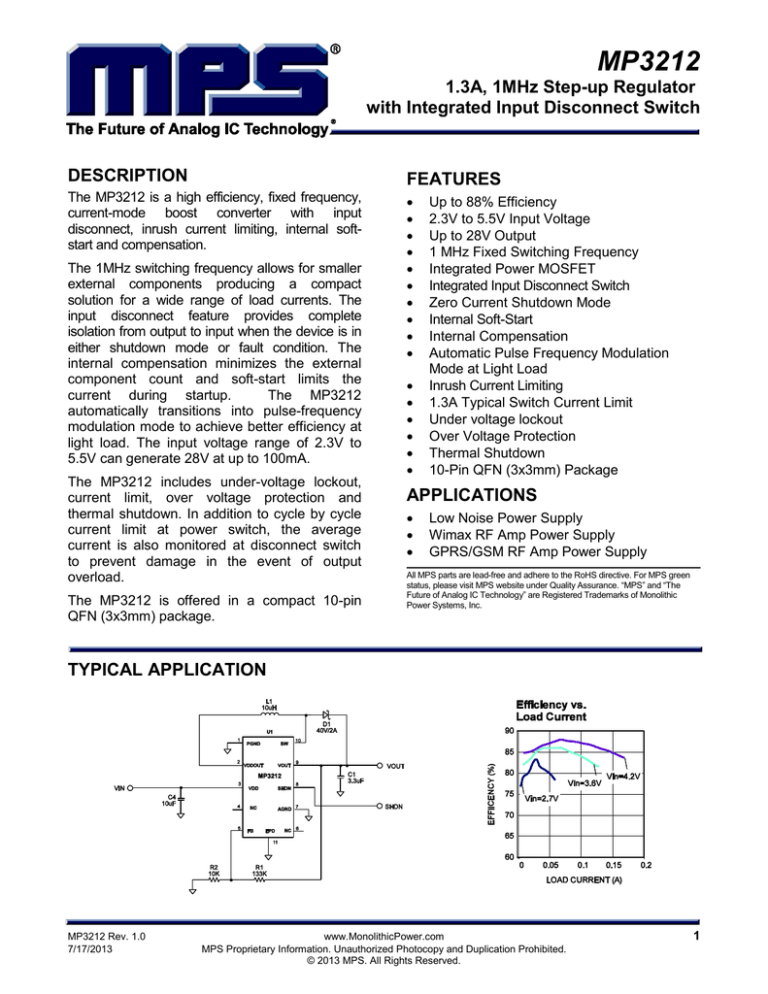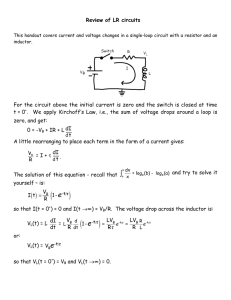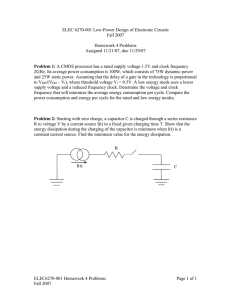
MP3212
1.3A, 1MHz Step-up Regulator
with Integrated Input Disconnect Switch
DESCRIPTION
FEATURES
The MP3212 is a high efficiency, fixed frequency,
current-mode boost converter with input
disconnect, inrush current limiting, internal softstart and compensation.
The 1MHz switching frequency allows for smaller
external components producing a compact
solution for a wide range of load currents. The
input disconnect feature provides complete
isolation from output to input when the device is in
either shutdown mode or fault condition. The
internal compensation minimizes the external
component count and soft-start limits the
current during startup.
The MP3212
automatically transitions into pulse-frequency
modulation mode to achieve better efficiency at
light load. The input voltage range of 2.3V to
5.5V can generate 28V at up to 100mA.
The MP3212 includes under-voltage lockout,
current limit, over voltage protection and
thermal shutdown. In addition to cycle by cycle
current limit at power switch, the average
current is also monitored at disconnect switch
to prevent damage in the event of output
overload.
The MP3212 is offered in a compact 10-pin
QFN (3x3mm) package.
Up to 88% Efficiency
2.3V to 5.5V Input Voltage
Up to 28V Output
1 MHz Fixed Switching Frequency
Integrated Power MOSFET
Integrated Input Disconnect Switch
Zero Current Shutdown Mode
Internal Soft-Start
Internal Compensation
Automatic Pulse Frequency Modulation
Mode at Light Load
Inrush Current Limiting
1.3A Typical Switch Current Limit
Under voltage lockout
Over Voltage Protection
Thermal Shutdown
10-Pin QFN (3x3mm) Package
APPLICATIONS
Low Noise Power Supply
Wimax RF Amp Power Supply
GPRS/GSM RF Amp Power Supply
All MPS parts are lead-free and adhere to the RoHS directive. For MPS green
status, please visit MPS website under Quality Assurance. “MPS” and “The
Future of Analog IC Technology” are Registered Trademarks of Monolithic
Power Systems, Inc.
TYPICAL APPLICATION
MP3212 Rev. 1.0
7/17/2013
www.MonolithicPower.com
MPS Proprietary Information. Unauthorized Photocopy and Duplication Prohibited.
© 2013 MPS. All Rights Reserved.
1
MP3212–1.3A, 1MHz, STEP-UP REGULATOR WITH INTEGRATED INPUT DISCONNECT SWITHCH
ORDERING INFORMATION
Part Number*
Package
Top Marking
Temperature
MP3212DQ
QFN10 (3mm x 3mm)
7F
–40C to +85C
* For Tape & Reel, add suffix –Z (e.g. MP3212DQ–Z). For RoHS Compliant Packaging, add suffix –LF (e.g.
MP3212DQ–LF–Z)
PACKAGE REFERENCE
ABSOLUTE MAXIMUM RATINGS (1)
Recommended Operating Conditions
VDD to GND ................................. –0.3V to +6V
VOUT to GND ............................. –0.3V to +35V
VSW to GND .............................. –0.5V to +36V
All Other Pins ................................ –0.3V to +6V
Continuous Power Dissipation (TA = +25°C) (2)
………………………………………………....2.5W
Junction Temperature .............................. 150C
Lead Temperature ................................... 260C
Storage Temperature .............. –65C to +150C
Supply Voltage VIN ..........................2.3V to 5.5V
Output Voltage VOUT ............................. 28Vmax
Operating Temperature ............ –40C to +85C
MP3212 Rev. 1.0
7/17/2013
Thermal Resistance
(4)
θJA
(3)
θJC
QFN10 (3×3mm) .................... 50 ...... 12 ... C/W
Notes:
1) Exceeding these ratings may damage the device.
2) The maximum allowable power dissipation is a function of the
maximum junction temperature TJ (MAX), the junction-toambient thermal resistance θJA, and the ambient temperature
TA. The maximum allowable continuous power dissipation at
any ambient temperature is calculated by PD (MAX) = (TJ
(MAX)-TA)/θJA. Exceeding the maximum allowable power
dissipation will cause excessive die temperature, and the
regulator will go into thermal shutdown. Internal thermal
shutdown circuitry protects the device from permanent
damage.
3) The device is not guaranteed to function outside of its
operating conditions.
4) Measured on JESD51-7, 4-layer PCB.
www.MonolithicPower.com
MPS Proprietary Information. Unauthorized Photocopy and Duplication Prohibited.
© 2013 MPS. All Rights Reserved.
2
MP3212–1.3A, 1MHz, STEP-UP REGULATOR WITH INTEGRATED INPUT DISCONNECT SWITHCH
ELECTRICAL CHARACTERISTICS
VDD = 3.6V, VGND = VSHDN = 0V, TA = 25C. CIN=10F, COUT=3.3F, L=10H, R1=10k, R2=133k,
unless otherwise noted
Parameter
Symbol
(1)
Supply Operating Voltage
Under Voltage Lockout High
Threshold
Under Voltage Lockout Low
Threshold
Condition
Min
Typ Max Units
2.3
5.5
V
2.3
V
VDD
VUVLO,HI
VDD rising
VUVLO,LO
VDD falling
2.2
1.8
2
Shutdown Current
IQ,SHDN
VSHDN = VDD
Supply Current (PFM)
IQ(PFM)
Not switching
180
Supply Current (PWM)
IQ(PWM)
Not switching
400
Switching Frequency
Minimum On time
FSW
tON, MIN
Maximum Duty Cycle
DMAX
SW On-Resistance
SW Leakage
ISW
SW Current Limit
ILIM
Input Disconnect On-Resistance
Input Disconnect Leakage Current
Soft Inrush Current Source at
VDDOUT
Logic High Voltage
Logic Low Voltage
RDS (ON)_VDDOUT
VFB = 0V
VDD –VDDOUT = 0.5V, tON
<2.048ms(2)
FB Voltage
VFB
FB Input Bias Current
IFB
ILEAKAGE
5
A
0.2
120
0.7
VFB = 1.23V
A
mA
2
Enabled, Input at GND
A
1.3
1
VHI
VLO
RUP
%
1
IOUT = 50mA, t>2.048ms(2)
SHDN = 0V
ISS_VDDOUT
A
1.15 MHz
ns
0.4
VSHDN = VDD, VSW = 30V
VDDOUT = 0V
1
80
A
A
90
I(SW) = 100mA
ISW_VDDOUT
Pull-up Resistor
Leakage Current when Disabled
1
0.85
RDS (ON)
V
V
V
1
1.2
M
1.23 1.26 V
-0.1
0.1
Disabled, Input at GND
A
1
A
Thermal Shutdown
TSHDN_TH
150
C
Thermal Shutdown Hysteresis
TSHDN_HYS
25
34
1.7
0.1
C
V
A
%
0.1
%/V
Over-voltage Thershold
Over-current Thershold
Load Regulation
VOV
IOI
ΔVOUT / ΔIOUT
Line Regulation
ΔVOUT / ΔVDD
FB=GND
t>2.048ms(2), DC current
IOUT = 50mA to 100mA
VDD = 3.6V to 2.6V, IOUT =
50mA
31
Notes:
1) Minimum supply operating voltage needs to be above 2.5V at -40C.
2) Timer is around 2ms-4ms.
3) Guaranteed by design, not tested.
MP3212 Rev. 1.0
7/17/2013
www.MonolithicPower.com
MPS Proprietary Information. Unauthorized Photocopy and Duplication Prohibited.
© 2013 MPS. All Rights Reserved.
3
MP3212–1.3A, 1MHz, STEP-UP REGULATOR WITH INTEGRATED INPUT DISCONNECT SWITHCH
PIN FUNCTIONS
QFN10
Pin #
Name
1
2
3
4
PGND
VDDOUT
VDD
NC
5
6
7
8
9
10
FB
NC
AGND
SHDN
VOUT
SW
MP3212 Rev. 1.0
7/17/2013
Description
Power Ground. The ground return for COUT and internal switch
Input voltage after passing through the input isolation FET
Actual input voltage before the isolation FET
No Connect
Feedback voltage.
No Connect
Analog ground
Shutdown. Active high
Output Voltage
Switch node.
www.MonolithicPower.com
MPS Proprietary Information. Unauthorized Photocopy and Duplication Prohibited.
© 2013 MPS. All Rights Reserved.
4
MP3212–1.3A, 1MHz, STEP-UP REGULATOR WITH INTEGRATED INPUT DISCONNECT SWITHCH
TYPICAL PERFORMANCE CURVES
VIN = 3.3V, VOUT = 18V, TA = +25ºC, unless otherwise noted.
MP3212 Rev. 1.0
7/17/2013
www.MonolithicPower.com
MPS Proprietary Information. Unauthorized Photocopy and Duplication Prohibited.
© 2013 MPS. All Rights Reserved.
5
MP3212–1.3A, 1MHz, STEP-UP REGULATOR WITH INTEGRATED INPUT DISCONNECT SWITHCH
TYPICAL PERFORMANCE CURVES (continued)
VIN = 3.3V, VOUT = 18V, TA = +25ºC, unless otherwise noted.
MP3212 Rev. 1.0
7/17/2013
www.MonolithicPower.com
MPS Proprietary Information. Unauthorized Photocopy and Duplication Prohibited.
© 2013 MPS. All Rights Reserved.
6
MP3212–1.3A, 1MHz, STEP-UP REGULATOR WITH INTEGRATED INPUT DISCONNECT SWITHCH
BLOCK DIAGRAM
Figure 1—Functional Block Diagram
MP3212 Rev. 1.0
7/17/2013
www.MonolithicPower.com
MPS Proprietary Information. Unauthorized Photocopy and Duplication Prohibited.
© 2013 MPS. All Rights Reserved.
7
MP3212–1.3A, 1MHz, STEP-UP REGULATOR WITH INTEGRATED INPUT DISCONNECT SWITHCH
OPERATION
The MP3212 uses a constant frequency, peak
current mode boost regulation architecture to
regulate the feedback voltage. The operation of
the MP3212 can be understood by referring to
the block diagram of Figure 1.
At the beginning of each cycle, the power
MOSFET-M1 turns on, to prevent sub-harmonic
oscillations at duty cycles greater than 50%, a
stabilizing ramp is added to the output of the
current sense amplifier. When the output voltage
of current sense amplifier equals to the output
voltage of error amplifier, the power MOSFET-M1
turns off.
The voltage at the output of the error amplifier is
an amplified version of the difference between
the 1.23V reference voltage and the feedback
voltage. The peak inductor current is
corresponded to the error amplifier output. If the
feedback voltage starts to drop, the output of
error amplifier increases, which results in more
current flowing through the power MOSFET-M1
and thus increases the power delivered to the
output. The use of current mode control improves
transient response.
To prevent the battery from discharging, when
MP3212 is disabled, the inductor is automatically
disconnected from the input supply.
The MP3212 has internal soft start control and
internal loop compensation to save external
components.
The MP3212 monitors input under voltage
conditions, output over voltage conditions, and
over temperature events for input under voltage
lockout, output over voltage protection and over
temperature protection.
Start-Up Sequence
After SHDN pin is pulled low, or a restart is
triggered by the fault condition, MP3212 will go
through a start up sequence described as below.
At the beginning of start up, the VDDOUT switch
is configured as the current source to regulate
the inrush current, and pre-charge the capacitor
at Vout. There is 2ms timer to make sure the
capacitor at Vout is charged up close to Vin
minus a diode drop. However, if Vout is still not
charged up after timeout, MP3212 will stay in this
mode.
After 2ms timeout, if Vout is charged up close to
Vin minus a diode drop, then the VDDOUT
switch will be fully turned on and connect the
inductor to VDD. MP3212 will enter soft start.
The error amplifier voltage is increased slowly
during soft start to prevent overshoot. When VFB
approaches the internal band-gap voltage, the
MP3212 starts normal operation.
Fault Control
FAULT DESCRIPTION
FAULT CONDITION
Under-voltage at VDD
V(VDD) < VUVLO,LO
Over-current drawn from VDDOUT
I(VDDOUT) > IOI
Over-voltage at VOUT
V(VOUT) > VOV
Over Temperature on chip
Tj > TSHDN_TH
MP3212 Rev. 1.0
7/17/2013
FAULT REACTION
Disables I/Os and waits until V(VDD)
reaches VUVLO,HI on to begin with the
start-up sequence
Disables VDDOUT switch and SW switch
and immediately restarts the start-up
sequence
Disables VDDOUT switch and SW switch
and waits until output voltage V(VOUT)
drops to VOV- VOV_Hys to restart the startup sequence
Disables VDDOUT switch and SW switch
and waits until junction temp drops to
TSHDN_TH- TSHDN_HYS to restart the start-up
sequence
www.MonolithicPower.com
MPS Proprietary Information. Unauthorized Photocopy and Duplication Prohibited.
© 2013 MPS. All Rights Reserved.
8
MP3212–1.3A, 1MHz, STEP-UP REGULATOR WITH INTEGRATED INPUT DISCONNECT SWITHCH
Maximum Duty Cycle
The maximum duty cycle Dmax will determine
the maximum output voltage that the MP3212
can provide. The maximum duty cycle is defined
by the minimum off time of the switch.
DMAX = 1 – toFF*Fosc
PFM Mode
During the light load condition, the MP3212
automatically enters pulse frequency modulation
(PFM) mode. In PFM mode, most of the internal
circuitry is turned off, only keeping alive the
active circuitry required to regulate the output
voltage.
Isolation From VIN (SHDN=High)
To prevent the battery from discharging the
MP3212 is automatically disconnected from the
battery when put in shutdown mode. The
MP3212 has an internal, low resistance isolation
FET that opens when the SHDN pin is pulled
high.
Average Current Monitor at the Disconnect
Switch
If the average current is above the over current
set value VOI, the isolation switch is open, the
boost switch is opened, MP3212 then
immediately goes into start-up mode.
APPLICATION INFORMATION
Components referenced below apply to
Typical Application Circuit on page 1.
Setting the Output Voltage
Set the output voltage by selecting the resistive
voltage divider ratio. Use 10kΩ for the low-side
resistor R2 of the voltage divider. Determine the
high-side resistor R1 by the equation:
R 2 (VOUT VFB )
R1
VFB
where VOUT is the output voltage.
For R2 = 10kΩ and VFB = 1.23V, then
R1 (kΩ) = 8.13 x (VOUT – 1.23) kΩ.
Selecting the Input Capacitor
An input capacitor is required to supply the AC
ripple current to the inductor, while limiting noise
at the input source. A low ESR capacitor is
MP3212 Rev. 1.0
7/17/2013
required to keep the noise at the IC to a
minimum. Ceramic capacitors are preferred, but
tantalum or low-ESR electrolytic capacitors may
also suffice.
Use an input capacitor value greater than 4.7μF.
The capacitor can be electrolytic, tantalum or
ceramic. However since it absorbs the input
switching current it requires an adequate ripple
current rating. Use a capacitor with RMS current
rating greater than the inductor ripple current
(see Selecting The Inductor to determine the
inductor ripple current).
To ensure stable operation, place the input
capacitor as close to the IC as possible.
Alternately a smaller high quality ceramic 0.1μF
capacitor may be placed closer to the IC with the
larger capacitor placed further away. If using this
technique, the larger capacitor can be a tantalum
or electrolytic type. All ceramic capacitors should
be placed close to the MP3212.
Selecting the Output Capacitor
The output capacitor is required to maintain the
DC output voltage. Low ESR capacitors are
preferred to keep the output voltage ripple to a
minimum. The characteristic of the output
capacitor also affects the stability of the
regulation control system. Ceramic, tantalum, or
low
ESR
electrolytic
capacitors
are
recommended. In the case of ceramic capacitors,
the impedance of the capacitor at the switching
frequency is dominated by the capacitance, and
so the output voltage ripple is mostly independent
of the ESR. The output voltage ripple is
estimated to be:
VRIPPLE
VIN
1 I LOAD
V
OUT
COUT fSW
Where VRIPPLE is the output ripple voltage, VIN and
VOUT are the DC input and output voltages
respectively, ILOAD is the load current, fSW is the
switching frequency, and COUT is the capacitance
of the output capacitor.
In the case of tantalum or low-ESR electrolytic
capacitors, the ESR dominates the impedance at
the switching frequency, and so the output ripple
is calculated as:
www.MonolithicPower.com
MPS Proprietary Information. Unauthorized Photocopy and Duplication Prohibited.
© 2013 MPS. All Rights Reserved.
9
MP3212–PRODUCT DESCRIPTION IN A PINCOUNT PACKAGE TYPE
VIN
) I LOAD
VOUT
I
RESR VOUT
LOAD
COUT f SW
VIN
(1
VRIPPLE
Where RESR is the equivalent series resistance of
the output capacitors.
Choose an output capacitor to satisfy the output
ripple and load transient requirements of the
design. A 3.3μF ceramic capacitor is suitable for
most applications.
Selecting the Inductor
The inductor is required to force the higher output
voltage while being driven by the input voltage. A
larger value inductor results in less ripple current
that results in lower peak inductor current,
reducing stress on the internal N-Channel.switch.
However, the larger value inductor has a larger
physical size, higher series resistance, and/or
lower saturation current.
should be rated for a reverse voltage greater than
the output voltage used. The average current
rating must be greater than the maximum load
current expected, and the peak current rating
must be greater than the peak inductor current.
Layout Consideration
High frequency switching regulators require very
careful layout for stable operation and low noise. All
components must be placed as close to the IC as
possible. Keep the path between the SW pin,
output diode, output capacitor and GND pin
extremely short for minimal noise and ringing. The
input capacitor must be placed close to the IN pin
for best decoupling. All feedback components must
be kept close to the FB pin to prevent noise
injection on the FB pin trace. The ground return of
the input and output capacitors should be tied close
to the GND pin. See the MP3212 demo board
layout for reference.
A 10µH inductor is recommended for most
applications. However, a more exact inductance
value can be calculated. A good rule of thumb is
to allow the peak-to-peak ripple current to be
approximately 30-50% of the maximum input
current. Make sure that the peak inductor current
is below 75% of the current limit at the operating
duty cycle to prevent loss of regulation due to the
current limit. Also make sure that the inductor
does not saturate under the worst-case load
transient and startup conditions. Calculate the
required inductance value by the equation:
L
VIN (VOUT - VIN )
VOUT f SW I
IIN(MAX)
VOUT ILOAD (MAX )
VIN
I 30% 50%IIN(MAX)
Where ILOAD (MAX) is the maximum load current, ΔI is
the peak-to-peak inductor ripple current, and η is
efficiency.
Selecting the Diode
The output rectifier diode supplies current to output
when the internal MOSFET is off. To reduce losses
due to diode forward voltage and recovery time,
use a Schottky diode with the MP3212. The diode
MP3212 Rev. 0.91
7/17/2013
www.MonolithicPower.com
MPS Proprietary Information. Unauthorized Photocopy and Duplication Prohibited.
© 2013 MPS. All Rights Reserved.
10
MP3212–1.3A, 1MHz, STEP-UP REGULATOR WITH INTEGRATED INPUT DISCONNECT SWITHCH
PACKAGE INFORMATION
3mm x 3mm QFN10
NOTICE: The information in this document is subject to change without notice. Users should warrant and guarantee that third
party Intellectual Property rights are not infringed upon when integrating MPS products into any application. MPS will not
assume any legal responsibility for any said applications.
MP3212 Rev. 1.0
7/17/2013
www.MonolithicPower.com
MPS Proprietary Information. Unauthorized Photocopy and Duplication Prohibited.
© 2013 MPS. All Rights Reserved.
11



